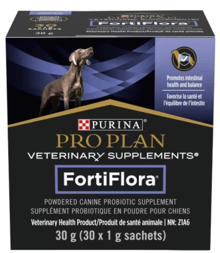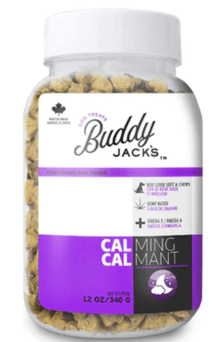Table of Contents
Like humans, dogs need certain vitamins and minerals in their diets to stay healthy. And also, like humans, certain dogs may need more of a certain nutrient to keep their bodies in a perfectly-balanced state.
In some cases, a dog might need supplements to prevent serious health issues from occurring or treat existing health conditions they are suffering from. From vitamin and nutrient deficiencies to helping to treat and prevent joint pain, there is probably a supplement for dogs that can offer a solution.
But supplements for dogs come in just as many forms as human supplements, so it’s important to choose the right supplement to support your dog’s health.
But with so many different types of supplements on the market, how are you supposed to choose the right one?
Some supplements are better for your dog than others. And if you’re going to feed your dog one, you want to be positive it’s actually going to benefit your pup.
In this article, you’ll learn all about the benefits of supplements, as well as tips and strategies for choosing the right one for your dog.
And in case you still have any doubts, we’ve provided you with seven solid reasons to use pet supplements.
Introduction to Dog Supplements
It helps to have a little background before we dive into the details. This section covers the history and benefits of dog supplements, as well as some general tips on choosing the right supplement for your dog.
Given the fact that human supplements have been helping us get more of the vitamins and minerals we need, it makes sense that eventually they would be repurposed to be given to man’s best friend.
As we learn more and more about the physiology of our dogs, the more that humans have been able to develop supplements to support their health.
For instance, dog arthritis is a common affliction for our pups, usually caused by genetics or the regular aging process. Dog supplements that provide additional glucosamine (which naturally occurs in dog and human joints) can give your dog extra support to keep their joint structures healthy, including their cartilage, ligaments, and joint fluid (synovial fluid).
Other dog supplements have been developed that provide benefits to essentially every structure in your pup’s body—from their digestive system to their skin and coat. Giving your dog supplements can extend their life, make them healthier, and reduce the chances of developing serious illnesses.
Dog supplements have become more and more popular in recent years, and for good reason! Supplements help ensure your pet has everything they need to live a long, healthy, and comfortable life.
A supplement is anything you feed your dog to enrich his normal diet.
But not all supplements are created equal.
A good dog supplement contains active ingredients that provide your dog’s body with key nutrients.
As supplements have gained popularity, responsible pet parents (like you!) are doing their homework on exactly what makes a good supplement. This means that manufacturers have started making dog supplements even healthier for your dog.
Way to go, pet parents!
Let’s get into the weeds now and learn more about the benefits of good dog supplements.
Benefits of Supplements for Dogs
Dog supplements offer a wide range of benefits, from preventing or providing comfort for conditions like arthritis to providing additional support in treating and preventing certain illnesses.
The benefits of giving your dog supplements includes:
Keeps Their Joints in Tip-Top Condition
Given the prevalence of joint conditions in dogs, especially as they get older, incorporating joint supplements into their diet is a necessity. Ingredients like glucosamine, chondroitin, MSM, and hyaluronic acid help keep your dog’s joints healthy and strong throughout their lifetime.
Boosts Their Immune System
A healthy immune system helps decrease your dog’s risk of conditions like heart disease, inflammation, cancers, diabetes, and more. When your pup’s immune system isn’t working at its maximum, they are also more susceptible to general illness, like infections. Dogs can get colds just like humans, but it’s a different kind of cold that usually indicates an infection and needs veterinary attention.
Improves Their Skin and Coat
If your dog has a greasy coat or dry skin, it’s an indicator of their overall health. Plus, skin conditions can be extremely uncomfortable and irritating for your pup to deal with. Supplements that include ingredients like omega-3 fatty acids, biotin, and amino acids can help keep their skin moisturized and their coat looking sharp.
Improves Cognition
Some dogs can develop conditions that affect their cognitive function over time, usually referred to as cognitive dysfunction syndrome. Sometimes, cognitive decline can be a normal part of aging, while other times it can be a symptom of nutrient deficiency. Giving your dog a supplement with vitamin E, C, L-Carnitine, and more (if their food doesn’t already contain these nutrients) can help their mind stay sharp over time.
Helps With Weight Control
While chunky dogs can be cute, it’s not the best for their health. Obese dogs have a heightened risk of heart, kidney, liver, and breathing issues, and the extra weight puts a lot of pressure on their joints as well. If your pup is having problems with their weight, the obvious first step is diet control. Feeding less isn’t always the right solution; always discuss options with your veterinarian. Your dog might need a special type of food, or have an underlying health condition that’s the culprit behind their weight gain.
For example, hypothyroidism, a condition where your dog’s thyroid doesn’t produce enough hormone, can cause your pup to gain weight because the thyroid hormone is associated with metabolism, so not enough of it means that your pup’s metabolic rate isn’t where it should be. In some cases, thyroid supplements that provide your dog with more thyroid hormone can help. However, make sure you talk to your vet first before you give your dog any supplement.
Types of Dog Supplements
Supplements for dogs come in a wide variety of formulations, from powders to capsules. This gives dog owners different administration options. However, some are easier to give than others, and some formulations may only be available in one type.
Dog Supplement Powder
When it comes to ease of administration, powdered dog supplements are one of the easiest to give your pooch. They are easy to store and have a long shelf life. Most powdered supplements come with a measuring scoop so it’s easy for you to give your pup the right dosage, and typically you can simply sprinkle the supplement on your dog’s existing food, so whether you feed a raw food diet for dogs or kibble, it’s easy enough to give to your pup without affecting the texture of the original food too much.
Plus, powdered supplements usually have a higher level of therapeutic ingredients compared to liquids, another popular supplement formulation, because the ingredients don’t need to be diluted. This means you don’t need to give your dog as much supplement in their daily dose, which helps with disguising the texture and taste of the supplement even more. Plus, you save money on supplement costs.
Liquid Dog Supplements
Liquid supplements are almost as easy to give as powders, but they might be a bit trickier to draw from the bottle using a syringe (which is usually provided). It can also be difficult to get all of the product out of the bottle, meaning that you’re likely going to throw away a dose or two.
Liquid dog supplements typically have non-active ingredients like flavourings to make the product more palatable as it’s not as easy to hide in food as powder, as well as preservatives to help with the product’s shelf life. Given the fact that liquid supplements are more dilute, the dosage is usually higher compared to a powdered supplement. This translates to a higher cost to you and increases the chance that your dog will notice the supplement and avoid it.
Chewable Dog Supplements
Chewables are a fun way to give your dog the supplements they need, as they are basically treats with some extra active ingredients mixed in. Because chewable supplements mimic treats, they often have the highest level of inactive ingredients out of all the supplement types. This is because chewable dog supplements are essentially a food item, so they need binders, preservatives, additives, fillers, and flavourings to keep the supplement together and to make it palatable for your pup, while maintaining a reasonable shelf life. These inactive ingredients provide no additional value to your pup aside from adding calories, which you may not want to do. After all, all those extra calories from food and treats during the day add up, and you may not want the dog supplement you give your pup to contribute to that daily dose of calories.
Chewable dog supplements also tend to have subtherapeutic levels of the active components that provide benefit for your dog. Simply put, there isn’t likely enough of the functional ingredients that will help your dog. Because of all the additional filler ingredients in chewable dog supplements, be sure to double-check the ingredients to ensure that they don’t contain anything that would cause adverse effects to your dog.
Capsule Dog Supplements
All those memes on the internet about trying to give dogs a pill have a lot of truth behind them. Capsules are one of the most difficult ways to give your pup a supplement because most dogs won’t just eat the pill—it needs to be disguised in something irresistible like cheese or deli meat. Even so, some pups can still eat around the pill, often dissolving it slightly and making it gooey and gross enough that you have to throw it away after a few tries.
There are techniques for getting your pup to swallow a pill, which usually involves lightly pinching your fingers on either side of their mouth to get them to open up, and then popping the pill as far back into their mouth as possible so they have no choice but to swallow. Sound difficult to do? That’s because it is. Your dog will also likely not cooperate with this process, making it even more tough to get them to take their pill.
Injections
Sometimes your pup might be severely lacking in a specific nutrient, meaning that they need an injection of the nutrient to get them back on track. Usually, injectable dog supplements are administered by a veterinarian, as you need special training to be able to successfully get the nutrient in your dog’s body, but sometimes the vet will teach you how to do it yourself. Used needles need to be thrown out properly in special sharps containers which will need to be brought to your vet for safe disposal once full.
5 Reasons to Use Pet Supplements
Giving your pet supplements is a great way to support their overall health as they age. From joint health to pregnancy support, let’s explore the main reasons why you should give your dog supplements.
1. Maintain Joint and Soft Tissue Health 
Joints are made up of cartilage, ligaments, tendons, and synovial fluid, which allow your dog’s joints to move smoothly. For joints as a whole to be healthy, all the different parts have to be healthy as well.
- According to one study, as many as 20% of dogs over one year of age are susceptible to developing joint problems, with osteoarthritis being one of the common conditions that dogs in the study showcased signs of.
- Arthritis is extremely common in old dogs (over the age of eight years)
- Purebreds are in the most need of joint support for dogs, with common afflictions aside from arthritis including elbow dysplasia, hip dysplasia, and luxating patella affecting dogs of all breeds
Dog joint supplements often contain active ingredients that also support the health of your dog’s muscles, tendons and ligaments as well as their joints. Glucosamine and chondroitin are building blocks for healthy ligaments and tendons, just like with joints.
Both ligaments and tendons allow your dog to move fluidly throughout his day:
- Tendons connect muscle to bone.
- Ligaments attach bone to bone.
Some signs your dog may be experiencing problems with his ligaments, muscles, or tendons are listed below:
- Limping
- Lameness
- Swelling
- Heat
Aside from helping your dog maintain overall ligament and tendon health, dog supplements can also help your dog recover from surgery. A 2015 study found that glucosamine and chondroitin enhanced bone-to-tendon healing in rabbits.
Active ingredients in joint supplements like glucosamine for dogs, chondroitin, MSM, and hyaluronic acid help maintain joint health and even repair worn-down cartilage and strengthen other joint tissues.
Some dogs, usually purebreds, are more prone to joint problems like luxating patella, arthritis, and hip dysplasia.
- Luxating patella is when the kneecap in your dog’s leg dislocates from the knee itself, causing pain, discomfort, and lack of mobility. Sometimes this condition can resolve itself (the kneecap pops back into place) but once your dog has had it, it can recur easily. Surgery can sometimes be done to help keep the kneecap in place.
- Arthritis is a catch-all term that describes degenerative joint issues that your dog faces, sometimes as a result of aging or genetics or as a secondary symptom from another disease. Essentially, the joint tissues are weakened and damaged, causing pain and inflammation.
- Hip dysplasia is just like it sounds—your dog’s hip joint (the ball at the top of their leg that sits in their hip socket) becomes misshapen and no longer fits in the hip socket properly. Surgery is usually the solution for this condition, but joint supplements can also assist with strengthening the joint structures and helping keep your pup pain-free.
Additionally, dogs that are a bit overweight might have more difficulties maintaining their joint health. Dogs that have had surgery on their joints also benefit from taking joint supplements.
2. Help with Digestive Issues
From dehydration due to vomiting and diarrhea to becoming nutrient deficient, having digestive issues can be a serious affliction for some dogs. Intestinal microbiota can become unbalanced in dogs due to stress, illness, or allergies. Pet probiotics help balance healthy gut bacteria so that your pup’s stomach and intestines will be able to digest and absorb nutrients from food easier, which reduces gas and instances of diarrhea.
Usually, dog probiotics are given for a short time to get your pup’s digestive system back on track. However, some dog foods and dog supplements may contain probiotic ingredients that can be given to your dog on a regular basis, like cranberry supplements for dogs.
Cranberry is a popular ingredient in dog food because the fruit contains a high amount of antioxidants, which help protect your pup’s body from damage caused by free radicals (unstable molecules which can potentially cause harm to other cells). Cranberry supplements for dogs are also often used to help prevent and treat UTIs. Cranberries are innocuous as an ingredient on their own, but as with anything you give your pet, you should check with your veterinarian to work out a good quantity to give, as there is no specific recommended daily dose.
Other antioxidants that you might find in your dog’s food that can provide some digestive benefit include:
- Blueberries
- Strawberries
- Raspberries
- Kale
- Spinach
- Beets
- Bananas
- Red cabbage
As with cranberries, it’s always a good idea to not go overboard with feeding your dog these fruits, as too much of a good thing can sometimes result in unwanted secondary effects for your pooch, like more diarrhea and vomiting.
Other supplements that can be given to your pup in certain circumstances to help with their digestive health include a dog fiber supplement, and calcium supplements for dogs.
- A dog fiber supplement might help your pup if they suffer from constipation, diarrhea, or problems with their anal glands. Typically, dog owners will add a dog fiber supplement, such as pumpkin, to a raw food diet for dogs to help their pup with digestion.
- Calcium supplements for dogs are often used in raw dog food diets to ensure that the dog is getting enough calcium in their blood to prevent hypocalcemia, a serious condition that can adversely affect your pup’s kidneys, liver, and pancreas.
3. Control Allergies
Food allergies in dogs are not that common as they tend to be allergic to things in their environment rather than food, but when food allergies do present in dogs, it’s just as debilitating. One of the most common allergy symptoms is itchy skin, usually on the paws, back, limbs, bum, and ears, which can cause pups to excessively bite and lick these areas leaving raw, painful patches.
There are no specific allergy supplements for dogs that can cure allergies entirely, but there are supplements you can give your pup that can help with skin issues that they may have developed due to an allergy. Fish oil for dogs is one example, as the omega-3 fatty acids help to maintain moisture in your dog’s skin, helping to relieve itchiness and improve their coat.
If your pup is sensitive to seafood, there are other options for helping keep their skin nice and moist:
- Coconut oil. Be careful about how much coconut oil you give your dog, as too much can cause general digestive discomfort, diarrhea, and lethargy. It’s best to introduce a little bit at a time into your dog’s diet, starting with ¼ teaspoon at a time and gradually moving up to 1 teaspoon (for small dogs) or 1 tablespoon (for large dogs) daily.
- Flaxseed oil. While flaxseed oil provides similar benefits for dogs as fish oil, it’s not as potent, meaning you might need to give a higher dose to your dog to see any benefit. However, a higher dose increases the chances of stomach upset.
- Nutritional yeast. Similar to flaxseed oil, the scientifically-proven benefits of nutritional yeast for treating dog’s skin condition are limited. But with that being said, sometimes it can be used to help dogs that have a Vitamin B deficiency, and its cheesy or nutty flavour can be used to improve the taste of dog food.
However, the allergen source should be investigated and mitigated as soon as possible to help prevent your pup from living with allergy symptoms. Food-based allergies can be investigated by switching your pup’s food to one with hydrolyzed protein, where the protein in the food is broken down to such small components that your pup’s body is unlikely to recognize it as problematic.
In addition, you can start feeding your pup a food with a novel protein, which is simply a protein that your dog hasn’t eaten before (e.g., duck, kangaroo, or lamb) to see if it solves the problem. Always discuss dietary changes with your veterinarian to devise the best plan to help your pup with food allergies.
4. Help with Anxiety
Anxious dogs are not only difficult to deal with in terms of behaviour, but the stress can cause them to develop secondary conditions that physically affect their health as well as mentally. Calming supplements for dogs, often containing melatonin, can help your pup cope with road or airplane trips, thunderstorms, and separation anxiety.
5. Nutritional Benefits
Some dogs can benefit from the added nutrition that some supplements bring. For example, liver supplements for dogs can sometimes be recommended for pups that show elevated liver values (chemicals in the liver) due to eating something potentially toxic or for another reason to help lower these values to an acceptable level. Milk thistle is a common ingredient in liver supplements for dogs because it helps protect the liver from damage and promotes bile flow, while curcumin (from turmeric) also promotes bile flow. These ingredients can help get your dog’s liver chemicals back to an acceptable level, naturally (always consult your vet before giving your dog a supplement).
If your dog is suffering from skin issues or has problems with digestion, they may have a zinc deficiency. Giant breeds like Great Danes, Huskies, and Malamutes commonly have this problem. Under the advice of your veterinarian, giving an approved zinc supplement for dog should get your pup’s levels back up to normal.
When to Consider Pet Supplements
Given the benefits that supplements for dogs have to offer, you may be wondering when the best time is to start giving your pup supplements. Here are some considerations to keep in mind:
Age
As our pups get older, their bodies aren’t as spry as they once were. In some cases, older dogs' bodies will stop producing certain hormones and other components that help them maintain their body structures.
For example, dogs’ bodies naturally stop producing glucosamine as they age, which affects their joints’ ability to repair and replace damaged cartilage. Without cartilage, the bones in your dog’s joint will rub together, causing pain from the friction. Giving your senior dog joint supplements is recommended to keep their joint health in check.
Breed
Certain dog breeds are more susceptible to medical conditions, like joint degradation and digestive issues. For example, Golden Retrievers and Labrador Retrievers are prone to obesity, so feeding them a diet low in calories is recommended. Boxers, on the other hand, can develop heart and thyroid problems, so avoiding foods or supplements with seaweed or kelp is recommended.
Injuries
If your dog suffers an injury to one of their limbs and requires surgery, joint supplements can go a long way with helping them recover.
Many veterinarians will prescribe NSAIDs (non-steroidal anti-inflammatory drugs) to help relieve dog joint pain. However, prolonged use of NSAIDs increases your pup’s risk of liver and kidney issues or failure, as well as ulcers in the stomach and intestines. If your pup already has issues with these structures, the risk of adverse effects is even greater, even with short-term use.
Thankfully, NSAIDs can be used in conjunction with joint supplements. The added support of the joint supplement usually allows you to decrease the dosage of the NSAID over time (with your vet’s recommendation) because the joint supplement is providing enough support for your dog’s joints. In many cases, NSAIDs can be eliminated altogether over time and the joint supplements can be continued.
Considerations When Choosing a Dog Supplement
Knowing how to read a supplement label is essential for being able to make a good decision on a dog supplement. Here are some key points to look for on a supplement label: Have no fear!
There are certain golden rules that can help you find the best supplement for your dog. You want a supplement that is:
- Full of active ingredients: The ingredients that provide therapeutic benefit for your pooch are considered active ingredients—meaning they have evidence-based, direct positive effects on your dog’s body rather than inactive ingredients like fillers, additives, and preservatives that don’t provide anything except empty calories. Most supplements that are worth looking at will separate the active and inactive ingredients that each dose contains, making it easier to determine how many active ingredients your pooch is getting per dose.
- Therapeutic amounts of ingredients in each dose: If the supplement you choose doesn’t directly list how many active ingredients are in each dose and instead lists the active ingredients per container size, you’ll need to do some quick math to determine the therapeutic ingredients in each dose. Calculate how many active ingredients your dog is getting with each dose by comparing the dose amount with the number of active ingredients. For example, if the dose is 1 g and the label says that dose contains 500 mg of glucosamine as the only active ingredient, then that means the other 500 mg is inactive ingredients that aren’t beneficial to your pup.
- Designations: To ensure the ingredients in the pet supplements you’re buying are vetted and tested, look for the Veterinary Health Product (VHP) designation for Canadian-made products (should be a maple leaf just above the barcode) or the NASC seal of quality for pet supplements made in the USA. If the supplement you’re choosing has one of these designations, it means that the ingredients in the supplement are independently batch-tested for quality control. TRI-ACTA products carry the VHP designation.
Always try to find dog supplements with as many active ingredients as possible. You want each item in your dog’s supplement to serve a clear health purpose.
Here’s an example of active ingredient you should look for in dog joint supplements:
|
Active Ingredient |
Benefits |
|
Glucosamine Sulfate / Glucosamine HCl |
Many dog supplements for joints contain one type of glucosamine, but both can be used in the same supplement to take advantage of the benefits of each. TRI-ACTA is one example of a joint supplement that uses both types of glucosamine. |
|
Chondroitin |
Prevents cartilage deterioration when paired with either type of glucosamine. |
|
MSM |
A natural anti-inflammatory that reduces swelling in your pup’s joints, relieving pain.Reduces joint pain |
|
Hyaluronic Acid |
Improves viscosity of the synovial fluid in your dog’s joints, which helps with ease of movement due to reduced friction. (which lubricates joints) |
Best Dog Supplements
Based on our criteria on what to look for in dog supplements, with a specific focus on active ingredients, we’ve compiled a list of recommendations for different types of supplements below:
1. Best Joint Supplement: TRI-ACTA Products

When it comes to a highly therapeutic joint support supplement for dogs with 100% active ingredients, it’s difficult to beat TRI-ACTA products. One of the main features of TRI-ACTA joint supplements is that they contain two types of glucosamine—sulfate and HCl—which if you recall from earlier in this article, provide their own unique benefits:
- Glucosamine sulfate supplies your pup’s joints with sulfur, which is an essential component that supports their joint structures, from the bones to the soft tissues.
- Glucosamine HCl is a highly absorbable form of glucosamine, meaning your pup’s body can take advantage of the benefits of this ingredient quickly after ingesting.
In terms of which product to give to your dog, there are two: TRI-ACTA and TRI-ACTA H.A. For dogs that need preventative joint care and don’t currently have joint issues, TRI-ACTA is a great choice as it’s our regular strength product. For dogs that have advanced joint degradation or a condition like arthritis, hip dysplasia, or luxating patella, TRI-ACTA H.A. is recommended due to the addition of hyaluronic acid.
Starts at $23.99 CAD for a 60g container of TRI-ACTA and $27.99 for TRI-ACTA H.A. Pricing as of August 2023.
2. Best Digestive Health Supplement for Dogs: Purina Pro Plan Veterinary FortiFlora

Sometimes your pup’s tummy needs a bit of readjusting to get it back into tip-top shape, whether it’s due to an illness, eating something they shouldn’t have, or just because you switched them to a new food.
Fortifloria is a powdered supplement for dogs that’s easy to administer, as the dosages come in pre-packaged little pouches that you simply tear open and sprinkle on your dog’s food. The mix of probiotics and digestive enzymes help balance your pup’s gut bacteria in as little as seven days, or as recommended by your veterinarian.
$42.99 for a pack of 60 pouches. Pricing as of August 2023.
3. Best Calming Supplements for Dogs: Buddy Jack’s Calming Hemp Functional Dog Treats

Trying to calm your dog down when they have anxiety can be a difficult time. One of the ways that you can help your dog feel more comfortable and reduce stress is to give them a calming treat like Buddy Jack’s. This treat is made with organic hemp oil and protein that’s grown in Canada, and includes omega-3 and omega-6 fatty acids to help calm your pup’s digestive system. Plus, the 60% beef liver gives it a flavour that your pup is sure to love. The actual calming ingredient is L-theanine, which helps with brain health and promotes calmness in your dog.
$24.77 for 340 g of chews. Pricing as of August 2023.
Conclusion

Dog supplements offer a wide range of benefits, from supporting muscles to managing hip dysplasia. Perhaps most importantly, supplements provide your dog with the foundation to live a healthy, active life.
When considering the best dog supplement for your pooch, always read the ingredient label carefully and try to avoid products with a ton of fillers.
Finally, look for active ingredients like glucosamine and chondroitin if you want to be sure you’re doing everything you can to maintain the health of your dog’s joints, muscles, ligaments, and tendons.
Dog supplements like TRI-ACTA and TRI-ACTA H.A. for pets are high-quality, no-nonsense options that meet all the criteria above and more.
Purchase TRI-ACTA online or discover where to buy in a pet store near you.
Newsletter Signup
Subscribe to our newsletter to receive the latest news and exclusive offers.
.jpg?height=2000&name=Cliick_Integricare-DISPLAY-REVISEDV2%20(1).jpg)
Proactive & Therapeutic Joint Supplements
When given daily, Integricare joint supplements recover bone and joint injuries faster and help prevent mobility injuries from happening in the first place.












